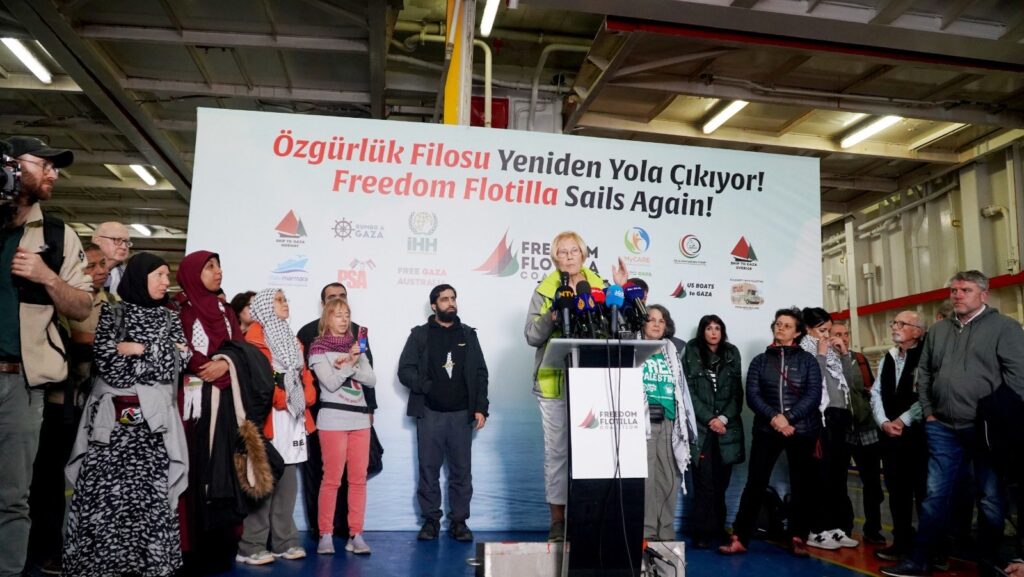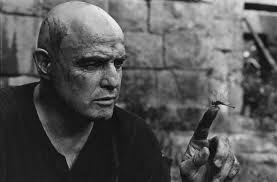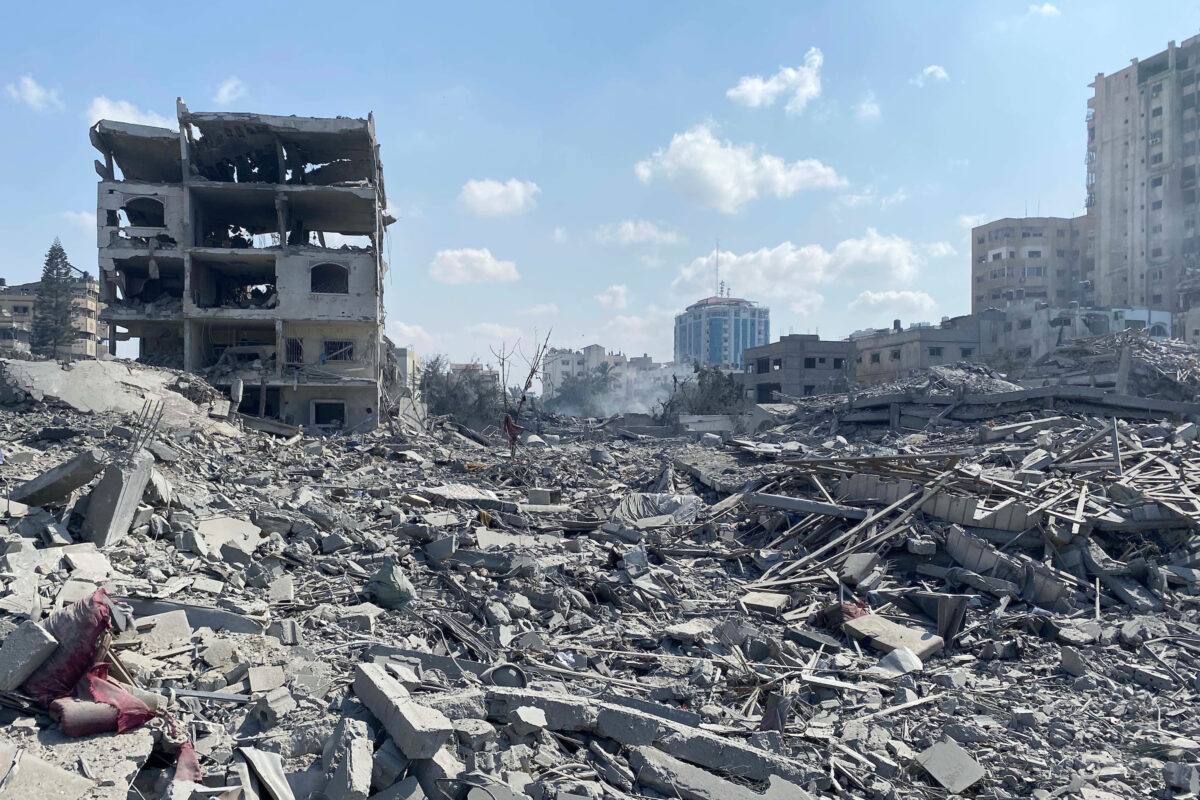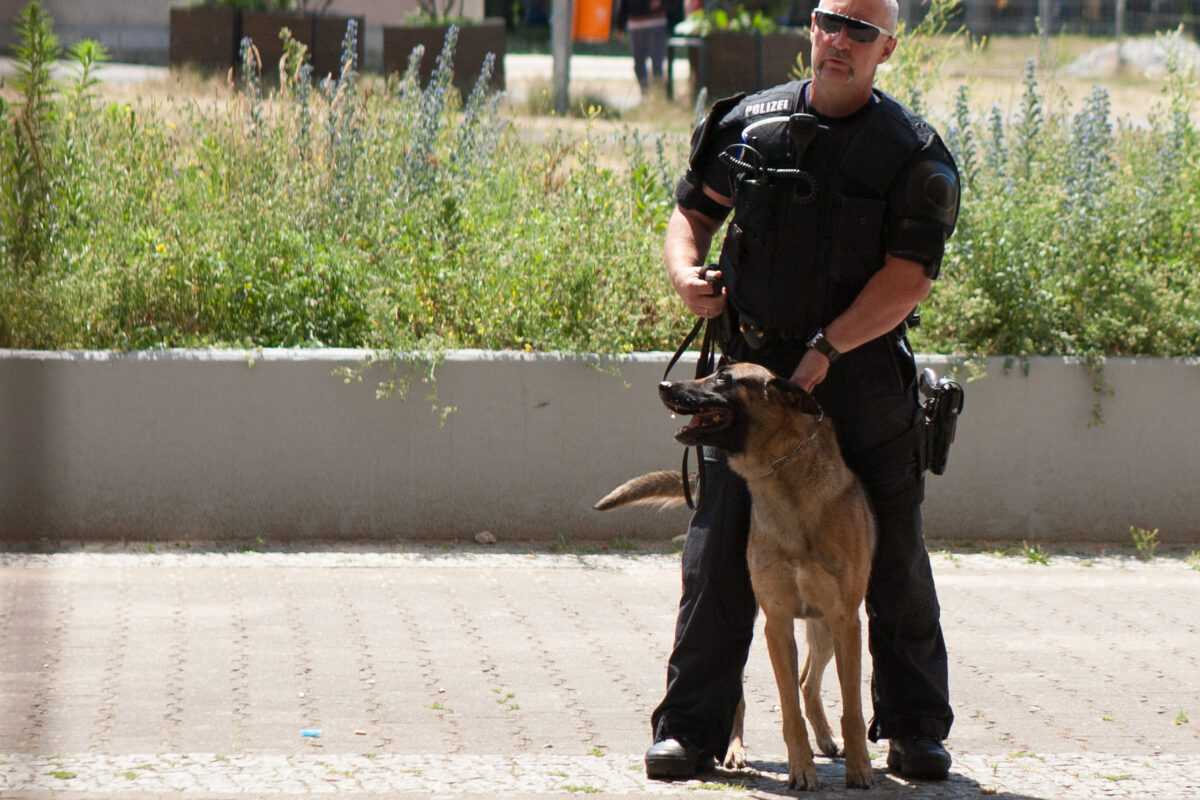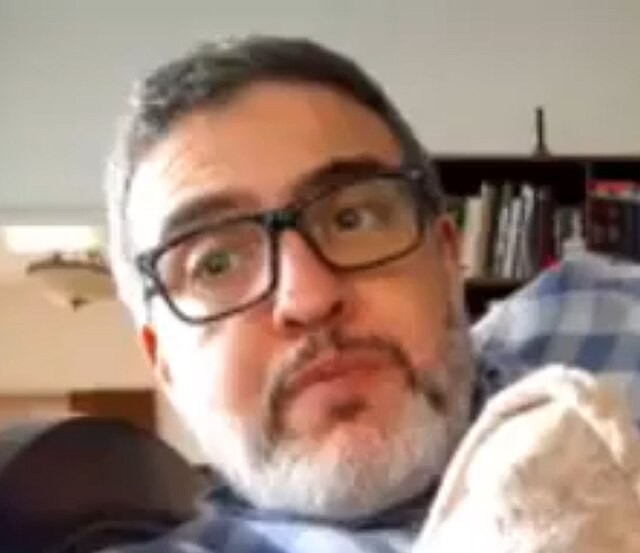Interview by Angela Schuldt and Jav Chavis.
Can you tell us about the nature of your initiative? Which organization are you working with exactly?
So, the Freedom Flotilla Coalition is, as its name implies, a coalition of campaigns. It is not an organization in itself. We have campaigns in different countries, and some campaigns are actually not connected to one country only. There is a campaign in the United States, one in Canada, in Norway, Sweden, Spain, Italy, Turkey, New Zealand, Malaysia. What am I missing? South Africa, of course. And then there are partner organizations like in France or in Australia.
Then we have other groups in Gaza itself who are partnered with us, like ‘We Are Not Numbers’ – young journalists who tell the stories from Gaza. They have been doing this for quite a number of years. And, unfortunately, during this genocide, they have lost a lot of their members. And also, the ‘Union of Agricultural Work Committees’ (UAWC) in their branch in Gaza is partnered with us, and what we do is we challenge the illegal and inhuman Israeli blockade by nonviolent direct action at sea. So, we sail towards Gaza, something that should be not only allowed by international law, but is actually asked for right now by the International Court of Justice because we bring aid and aid should be allowed in.
Historically, our actions are met with a violent reaction from the occupier. They usually come towards our boats in international waters. They stop us. In 2010, they used live ammunition to shoot at people. They killed 10 activists on board and wounded 56 and then they always kidnap all of us, deport the international activists, accusing them of having entered Israeli illegally, and confiscate our boats.
Now you are putting together a new mission, and you’re sailing towards Gaza. There are many risks. But you also mentioned the legal situation. So, what do you think would be different this time? And how are you preparing for the possible challenges or even the violent responses that this can bring?
Well, we have been assessing the situation, actually since 2022, I guess, when this new Israeli government came into power and we thought that, you know, their reaction was quite unpredictable. Of course, what we see in Gaza now, a full-fledged genocide that’s been happening and televised and, you know, advertised all over the world. And then the international community seems unable or unwilling to stop this. That’s where we see our role as civil society organizations.
We are not connected with any government. We need to act. We need to do something because our brothers and sisters in Gaza are in desperate need, and we are aware of the dangers. We will proceed cautiously, we do not want to put our participants or our boats at risk, and yet we are fully backed, as I said, by international law, by decisions of international courts. What we do is completely legal and right and moral, and whatever reaction we are met with is not in our control.
We just have to do this.
How can you organize, especially now that we see that there are many governments supporting Israel? What are the reactions from some of these governments to the Flotilla?
We’re a civil society endeavour, and all this, all our actions are possible through donations from people, individuals all over the world. And the aid we get is basically things that are necessary in Gaza and that can be delivered as we plan to deliver them: by sea. We are aware that Gaza should not need aid. Without the occupation, without a blockade, Gaza should be perfectly capable of providing for its people, being part of Palestine, which is a very rich land. You know, we know of the natural resources, including natural gas, offshore of Gaza.
And they should be able to not only care for themselves, but prosper. What we do now is we deliver aid because there is a political, human-made catastrophe going on there, and it’s needed for people to survive. But we are also aware that whatever amount of aid we are capable to bring is nothing compared to all the aid that is waiting already in Rafah and in other places, which is being prevented from reaching the people, and this by the same people who are committing a genocide. These people have the intention of eliminating all life in Gaza.
There are other attempts, or other missions, delivering aid to Gaza. But these missions are coordinated with the occupier. And we saw what happened to the aid workers from World Central Kitchen who were bringing aid, and it was a very, how would I say it? A propaganda stunt. How they say, ‘Oh, look, we’re bringing aid’. ‘We’re building a temporary pier’. And then they kill these people who have been coordinating with them. We refuse to coordinate with the same people who are committing genocide, or with their allies.
This is the difference in what we do. And we have a long history of challenging Israel. And this radio communication that was also broadcast of, you know, the Israeli Navy allowing the boat to go through, and they say ‘You are entering an exclusion zone or a zone under maritime blockade, but we allow you exceptionally to go in’. The communication we always have with the Israeli Navy is ‘You are entering an exclusion zone’ or ‘a zone under maritime blockade’, and ‘we will stop you by all means necessary’. And we refuse this.
We don’t think Israel has a right to stop us. As I said, international law –decisions by international courts– support what we’re doing. Whether it’s dangerous or not is not because what we do is dangerous, but because of the reaction of the occupier. The Israeli government is intent on committing genocide. This is the problem, and this is what we should focus on.
We have been planning this for quite a number of months, but getting the boats and getting everything ready takes time. And so we are only sailing now, but we are not going to sail from very far away. People will be flown in, but the aid and the boats will be organized in the Mediterranean. So, actually, the sailing time is not so long. However, challenges with governments such as the US or Britain are big. I suppose that participants from those countries cannot expect much protection from their governments because of what we try to do. We bring aid, but we bring it accompanied by international observers.
Our participants who come from different countries are the protection for the aid to go in, because we expect those governments to actually take care of their own citizens and say Israel is not allowed to attack these civilians, they are only doing what’s right and are not any threat whatsoever to the state of Israel. The state of Israel has no right to attack a boat in international waters. This is an act of piracy. But we have seen what happens in Yemen when people are trying to actually uphold international law and try to prevent war crimes – they’re being bombed.
So, we do not know exactly what those powers, those allies that the occupier has, will do. We definitely have not heard any support from those governments, and actually members of our campaigns in the US are regularly being arrested while protesting in the US Congress against this genocide.
What is your motivation for doing this?
So, my personal story is that I am an Israeli. I was born in a Jewish family in Israel. So my motivation first of all as a human being, but also as an Israeli, is to do something against what my government is committing. You know, it has been a crime for many years, just look at Gaza. But what is happening right now is so unbelievably evil that I feel like I cannot sit at home and worry about a risk to me personally. And this is the conversation I’ve had with my mother. I understand her. She’s worried about me, but I say ‘every person in Gaza, whether they’re a child or an adult, has a mother or had a mother worried about them, and yet they are being slaughtered and starved to death, and we cannot just sit idle here’. I also have to say that from my own upbringing as an Israeli Jew I was taught by Holocaust survivors that the world was silent during the 2nd World War. We cannot do this, we cannot be silent, we cannot not do anything in our power to stop this. I can also say I live here in Germany, and the reason I have a German passport is because of my family history. This is the only reason. Germany gives an Israeli citizen a German passport because they are aware that they have a responsibility: because my grandparents were refugees. And yet Germany supports this. Most of the population in Gaza are refugees and their right to return to their home in historical Palestine is not recognized by Germany or any other power. My privilege and the fact that I can raise a voice, that I can do something, is my bigger motivation, because I say having this possibility, having the freedom to board a ship and to sail towards Gaza obliges me to do so.
And I cannot, sorry, I cannot speak about motivations of other people but I think most of the people who do this just try to save their own humanity. And the whole mission shows a great amount of international solidarity from the people involved from all different parts of the world.
Are there also connections or solidarity between other movements? From other causes related to issues in other countries that somehow show solidarity towards Gaza, to your cause and to the Flotilla?
Yes. Of course. Our struggle against injustice in Palestine is connected very strongly with Indigenous struggles around the world because what is happening in Palestine is actually not a war. It is a native population struggling against the settler colonialist project, which is the Zionist project aiming to eliminate the diversity of what Palestine used to be, replacing it with something only for Jews. And so, the Indigenous struggle is very important.
I can also see how it should be an environmental struggle because of the destruction, not only in Gaza, but everywhere. We can see, you know, ancient olive trees being burnt and uprooted. And in the West Bank as well, we see a devastation of the natural environment in Palestine due to this settler colonial project. Unfortunately, voices like that of Greta Thunberg, who tries to say that these struggles are connected, are being silenced, especially here in Germany.
Moreover, in the Mediterranean, where we sail, there are also a lot of missions to rescue refugees. And we do have a lot of connections with these missions. A lot of the people we count on are, for example, doubling up, working in both projects. And this is what I said, it’s so much a human cause, and people who are human right defenders should see that this is only part of the bigger struggle to respect and to maintain human rights.
And then also, because you told us that you are a German citizen already, and we have seen what happens, especially in a place like Germany where the label of antisemitism has been politically instrumentalized, how was it for you?
Well, I would like to say that it’s ridiculous. The antisemitism tagging is a cynical attempt by the Zionist regime to divert attention from its own crimes, from a systematic injustice, systematic discrimination that is based on racism, and trying to say that when you criticize this, you’re being antisemitic. Antisemitism is actually just one form of racism and should be fought against together with the anti-racist movement in general. It’s unbelievable, actually, that I’ve seen this in Berlin this last weekend [12-14 April 2024] when Jewish voices against the genocide are being silenced by the German police. Literally taking out the plug and taking away microphones from people who are trying to say this cannot be done in our name. But as I said, you know, the most important thing is to speak about what is actually happening in Palestine. Speak about the truth.
And every attempt to speak about the way Palestinians choose to resist, whether it’s through a completely non-violent call for boycott, divestment, and sanctions, or if it’s popular resistance, like we see in the West Bank against the apartheid wall, or even armed struggle. All these things are legitimate under international law and instead of speaking about the reason these things exist there is an attempt to eliminate Palestinians from Palestine. And when they react, we cannot speak about their reaction without speaking about the root cause. Let’s speak about what Zionism has been doing in Palestine for over 100 years, and then we can analyze the best way to combat this. But it’s not for us to decide. It’s for the Palestinians to decide how they want to face this. And as you said, accusing Jews or even Palestinians of being antisemites is a contradiction in terms. We are semites. We are not self-hating. We do this out of love for our people. I do this because I love my family. I do this because I have friends in Israel, in Palestine, and I can see that what is going on there is not for the benefit of people. It may be for the benefit of arm dealers, of people who make money out of death, but not for the people themselves.
Do you feel your safety has been, anyhow, affected, since October 7?
I don’t appear so Jewish. I reverted to Islam about 2 years ago, and I wear a hijab. So, I think that if I experience discrimination at all, I experience it more because Islamophobia is actually making Muslims feel very, very unsafe. More than Jews who are a much smaller fraction of the population. I do understand that Jewish people may feel unsafe, but I would say again that the major cause for their insecurity is actually the acts of the Israeli government and the fact that it tries to present itself as the sole representative of Jews all over the world, which is causing this insecurity.
So, again, we go back to this argument of antisemitism. This is the problem of the definition of antisemitism by this international holocaust remembrance alliance (IHRA), where they try to stick together things that are legitimate criticisms of Israel with real acts of Jew hatred. And when you mix these two things up, you come up with a much greater incidence of antisemitism. If we separated these two things, we would see that though antisemitism may be a real problem, it should be combated in the frame of anti-racism and not in the frame of a state, doing what is illegitimate, illegal under international law, and that should be criticized and actually stopped and not supported as Germany does. And if Germany really wanted to support Jewish existence or human rights in general, it should be against what Israelis are doing exactly because of the German past and not try to say whatever Jews do, whether they commit genocide or just ethnic cleansing, this is okay because of whatever we did to Jews during the 2nd World War.
When was the last time that the Flotilla attempted to go to Gaza?
So, we sailed in 2018, and this was a long voyage. We sailed from Norway and Sweden. There were 4 boats involved, and we did a long tour of European ports. In the end, only 2 boats were able to sail the last stretch from Italy to Gaza, and we were stopped in international waters. I was on board one of the boats. We were taken by the Israeli Navy to the Israeli port of Ashdod and were processed as if we had entered Israeli illegally, even though they kidnapped us in international waters. They were very violent towards our captain. Other people on board suffered injuries and most of our belongings were stolen from us, including a bible from our ship doctor, doctor Sway, who is a British citizen.
We were planning to sail in 2020 and then we couldn’t do so because of Covid. And so, it has taken us a long time to prepare this next mission which will start in May. It’s called ‘For the Children of Gaza’. This genocide sort of forced us to do something, but also enabled us because there is so much international solidarity, so much awareness, so many people who are desperate to do something that we just felt we have to do whatever we can as soon as we can. And this is what this break-the-siege mission involves.
Probably you cannot give all the details, but what is planned? How many boats are sailing?
So, we have a number of boats. I cannot say exactly how many, but hopefully more than 3. We are still finalizing the details so we cannot say as yet the exact number. We did say that we have a cargo ship that carries 5,500 tons of aid. And there will be some aid also loaded on the boats that carry the international observers. As I said, we will sail from ports in the Mediterranean, but we cannot say yet which ports.
The sailing is not very long in time, but we will proceed cautiously. We will try to create enough momentum so that the international community comes to its senses and assures us that we will not be attacked by putting a diplomatic pressure on Israel.
What we’re doing is completely legal, moral, human, and we need all eyes on this. We reveal the information when we can reveal it, when there is something to say. We do not withhold information from the public. Media do not have to support what we’re doing, but we hope that they would like to cover it and to show the world the truth of what is happening. We, of course, need all eyes on our mission. This is the only guarantee, if there is a guarantee of our safety.
And how can people help?
We offer people a whole range of things that they can do. I invite people to go to our website. There is a section there saying, I want to help. And the basic thing is just to follow us on the website and on social media. We have several platforms that people can sign up to, follow, share, and spread the world as much as they can. We know that mainstream media is also complicit in this genocide. It shows some of what is happening, but it’s very, very biased in its portraying of what is going on, as if Israel is trying to defend itself, which is, of course, absolutely false. So, following us and spreading the word is one very, very important thing.
Also, we invite people to organize, to get in touch with their local campaigns, or to create new local campaigns. I’ve been trying very hard to get more organizations here in Germany to support this. And, you know, hopefully, this will be an incentive for people to reach out and say, we want to organize because we need a large network of people concerned with human rights to join forces, as we said, also with other topics, other issues, because it’s all one struggle. And together, we can actually make a difference.
Thank you very much for your time, really. We have the utmost respect for what you’re doing. We wish you the best. We will be following you and trying to organize, gather forces here in Berlin, to donate, to participate, to support you, on different social media platforms.
More Information:
